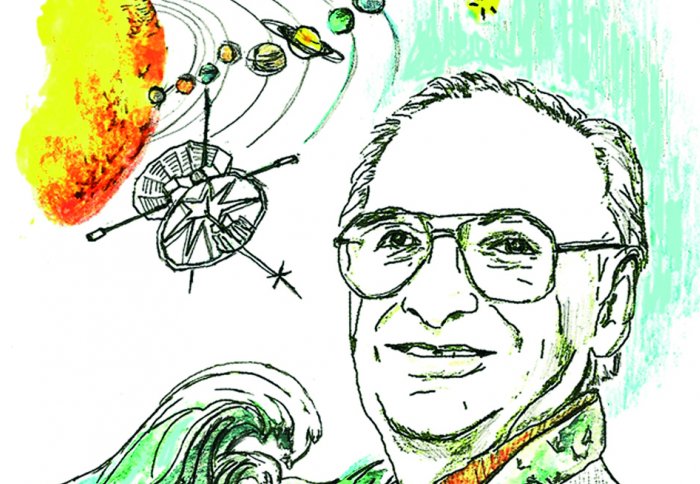Obituary: Robert Benzwi (1919-2011)
by Kerry Noble

Earth's boundaries were no constraint for one Imperial alumnus. Engineer Robert Benzwi worked on the first NASA missions exploring our solar system.
Bob Benzwi, who died on 3 May 2011 aged 92, had a taste for adventure even into his nineties. Wearing two or sometimes three swimming caps to keep warm, he liked a winter dip in the Pacific Ocean, especially in rough seas. As the oldest member of La Jolla Cove Swimming Club in California, Bob spent his autumn years swimming in chilly open waters. As a younger man space was the territory he explored, working on pioneering missions that went further from Earth than ever before.
Robert Benzwi was born Reuven Kossoy in Ukraine in 1919. The country was still in the grip of chaos following the Russian revolution and, when he was three weeks old, his family fled to Istanbul. There Bob grew into a talented student, picking up mathematics and languages with particular ease. He continued his studies in Haifa in the Middle East, where he was inspired by the activist Yitzhak Ben-Zvi, another Jewish émigré from the fallen Russian Empire who went on to become the second leader of Israel. Bob adopted a form of his surname.
Pursuing his flair for mathematics Bob studied civil engineering in France, but his time there was interrupted dramatically by the outbreak of the Second World War and the subsequent Nazi invasion. He fled from mainland Europe aboard a Dutch ship bound for the United Kingdom, becoming once again a refugee.
Initially he focused on using his engineering expertise on the war effort, repairing equipment damaged by bombs. He later took a postgraduate degree in aeronautics at Imperial, joining other academic refugees from across Europe for whom the College provided a safe haven during the war.
On graduating in 1945, Bob designed aircraft parts for the Bristol Aeroplane Company before moving to the United States in 1948. After his marriage he became a US citizen, able to follow career paths previously closed to him. He joined the General Dynamics Corporation, a specialist in the aerospace industry based in San Diego, working closely with the newly formed National Aeronautics and Space Administration (NASA).
Bob Benzwi’s engineering skills helped unmanned missions to break new ground. As a member of the teams working on the Mariner and Pioneer missions, he designed crucial parts of the space vehicles that revealed craters on Mars, took measurements on Jupiter and made the first direct observations of Saturn. Emeritus Professor Andre Balogh (MSc Physics 1966) from Imperial’s Department of Physics described the 1960s as an era that produced groundbreaking space missions in an amazingly short time. “Those were years when everything was still there to be discovered from space; they were exciting and fastmoving,” he said.
Bob later led the Helios programme of the 1970s and 1980s, sending probes close to the sun, which, according to Balogh, provided observations so unique that our knowledge of how the Sun shapes the interplanetary medium still depends on the data gathered. “Robert Benzwi and his generation of space scientists and engineers have left a very solid inheritance,” he said.
In retirement Bob frequently visited family in Asia and Europe, but was always pulled towards home and the delicious La Jolla Cove where he learnt to swim. He took up painting and in a spree lasting several years produced landscapes that covered his front room. “He would get excited about things and just take off,” said his friend, Bob West. Bob’s eagerness to gain new knowledge and skills was a lifelong trait that earned him a place in the history of space discovery and a firm fan base among La Jolla swimmers.
Illustration: Donna McKenzie
This article first appeared in Imperial Magazine, Issue 37. You can view and download a whole copy of the magazine, from www.imperial.ac.uk/imperialmagazine.
Article text (excluding photos or graphics) © Imperial College London.
Photos and graphics subject to third party copyright used with permission or © Imperial College London.
Reporter
Kerry Noble
Department of Surgery & Cancer